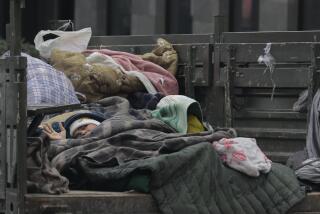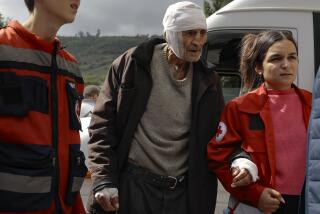Moscow Sends in Troops to Quell Ethnic Strife in Disputed Nagorno-Karabakh
- Share via
MOSCOW — Faced with renewed communal violence, the Soviet government has deployed troops to keep the peace between Armenians and Azerbaijanis in the disputed region of Nagorno-Karabakh, the Communist Party newspaper Pravda reported Thursday.
Tension had increased sharply, according to Pravda, as Armenians in Nagorno-Karabakh escalated their demonstrations demanding the region’s transfer from the Soviet republic of Azerbaijan to the neighboring republic of Armenia--and Azerbaijanis stiffened their opposition to such a move.
“In a number of towns, including some in Nagorno-Karabakh, soldiers have been brought in,” the paper said, confirming earlier reports that troops had been deployed to prevent new violence.
The grimly worded report from Stepanakert, the regional capital, left little doubt that the Kremlin is facing a grave crisis in that remote southern part of the Soviet Union.
The potentially explosive conflict between Armenians and Azerbaijanis--between Christians and Muslims--challenges not only Moscow’s ability to govern this multinational country but also the political reforms undertaken by Soviet leader Mikhail S. Gorbachev, and ultimately the fundamental political loyalties of millions of people.
“It seems as if the situation could not be worse,” Pravda said, describing the monthlong general strike in Stepanakert and other towns in Nagorno-Karabakh. “As if under mass hypnosis, the Armenian population is coming out day after day for meetings and demonstrations. They apparently will not return to work until the ‘Karabakh question’ is settled. . . .”
It added: “Only calm, self-control and a clear understanding of the current situation can guard against the most highly undesirable consequences.”
Special Conference
A special Communist Party conference to be convened here next week will discuss the country’s growing ethnic problems, party officials said Thursday, although the specific question of Nagorno-Karabakh is not on the agenda.
The central government has recently faced nationalist protests in the Baltic republics of Estonia, Latvia and Lithuania, in the Ukraine, in Soviet Central Asia and from such small ethnic groups as the Crimean Tatars, who are seeking the redress of longstanding grievances.
“The question is urgent, it is pressing, and it occupies the minds of many delegates to the party conference,” a senior party official said Thursday. “Democracy, greater democracy, is the basic answer, and we must find a way to ensure that it gets to Nagorno-Karabakh and every other such region of the country. This is a very, very urgent task.”
The Nagorno-Karabakh assembly voted again this week to ask the central government to transfer the region, three-quarters of whose estimated 184,000 residents are Christian Armenians, from Azerbaijan, where the majority of people are Turkic-speaking Muslims.
The Armenian legislature had adopted a similar resolution earlier in the month, but the Azerbaijani legislature, in an opposing resolution, objected strongly to the proposed transfer.
The issue now goes to the Supreme Soviet, the national Parliament, for a decision, but so far attempts to reach a compromise have failed.
At least 35 people, most of them Armenians, have been killed in ethnic clashes, according to government figures. Dissidents put the figure much higher. They say 12 people were killed in fighting last weekend in the Armenian town of Masis.
Soviet historian Roy A. Medvedev, who has followed the situation closely, said here this week that he fears that armed clashes will result from the increased tension.
“The situation is becoming more and more tense in Nagorno-Karabakh,” Medvedev told a news conference. “There are enough weapons there now to supply several divisions.”
Pravda confirmed that despair is growing among Nagorno-Karabakh’s residents. It said they have lost faith in local Communist Party leaders and see no way out of the deepening crisis, which is now in its fifth month.
“Many understand the senselessness and absurdity of their method of self-exhaustion, but there is nothing they can do,” Pravda said, referring to the Armenian protests in Stepanakert. “The affair has gone too far.”
Calls by the Communist Party hierarchy, government officials and local community leaders for a quiet resolution of the problem have been virtually ignored.
More to Read
Sign up for Essential California
The most important California stories and recommendations in your inbox every morning.
You may occasionally receive promotional content from the Los Angeles Times.













